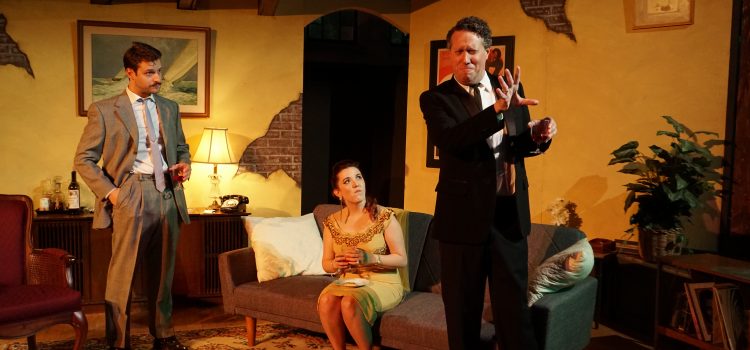By Lynn Venhaus
During the ten-minute intermission, I overheard a woman in the audience tell her companion: “I hope my kids don’t find my diaries.”
Whoa, and that reaction was before The Midnight Company’s seismic second act of “Rodney’s Wife.” I surmised other parents probably shared that sentiment at some point during this unsettling, distressing drama written by Richard Nelson.
Director Joe Hanrahan, who is eager to explore different dimensions, does not shy away from edgy or dark, thinks cinematically, and has an affinity for the period and the inner workings of show business, slowly pulling back the curtain, so to speak.
He has assembled a cast of six local acting heavyweights, who illustrate why they are so highly regarded, and the retro Italian setting is a designers’ dream.
The daughter of Rodney and his second wife, who found her mother’s diary from an eventful summer in 1962, introduces herself and takes us back to that time.
Kelly Howe is believable in dual roles, carefully choosing what emotion to display when. The statuesque Fay is a former actress who had married a widower 10 years ago. Rodney (John Wolbers) is now a fading movie actor. Is she content in her current role as “Rodney’s wife”?
In a quietly shattering performance, Howe starts out staying in the background while other big personalities suck the air out of the room — and then tries not to be suffocated.
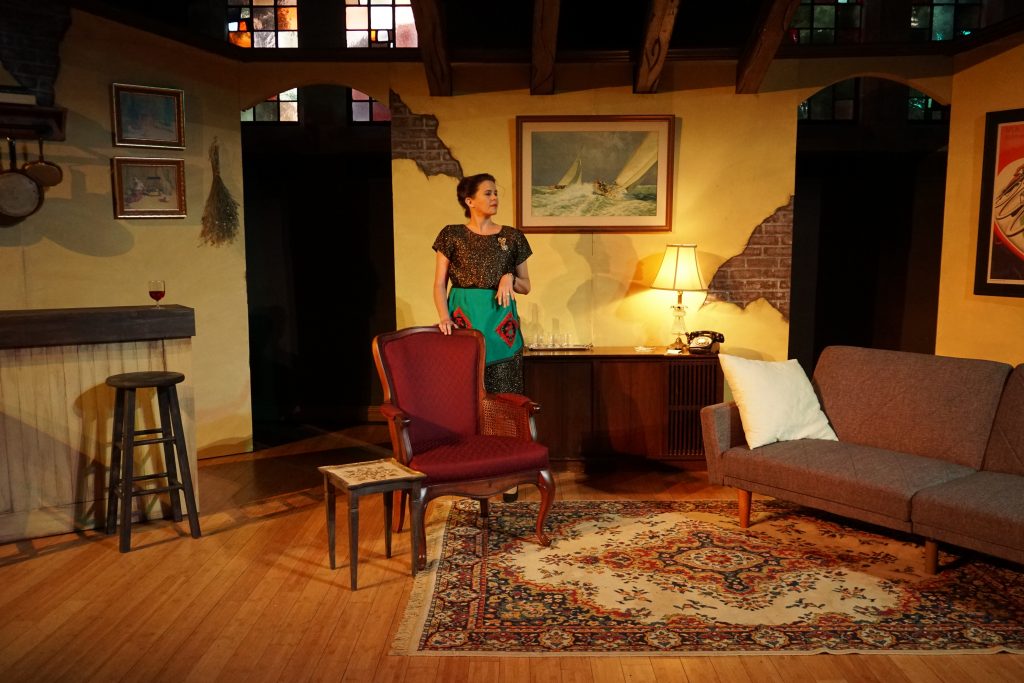
Her arrogant, domineering husband and his overbearing, busybody sister Eva (Rachel Tibbetts) try to control the temperature in the room. Eva was married to Rodney’s manager but is now a widow.
For people who pretend to live out loud, something is obviously ‘off,’ and subtle clues poke through the facades. Nelson builds tension, with anxiety and desperation fighting for attention in a shades of Anton Chekhov meets Tennessee Williams way, minus all-encompassing gloom and predictably overwrought hysteria.
Without spoiling any crucial plot turns, “Rodney’s Wife” has many layers and moving parts in its portrayal of a dysfunctional family. Oh, it’s complicated, all right. The melodramatic action is akin to divulging bombshells on a TV soap opera, and torching others with the secrets.
A prolific American writer, Nelson won a Tony Award for best book of a musical (James Joyce’s “The Dead” in 2000), and several Obie Awards. “Rodney’s Wife” was mounted off-Broadway in 2004 at the Playwrights Horizons, starring David Strathairn and Jessica Chastain as father and daughter.
As Fay prepares for a small celebration in a rented villa on the outskirts of Rome, well-heeled and seemingly carefree folks rush in, laughing and drinking copious amounts of alcohol. Rodney’s daughter Lee (Summer Baer), who has been mostly away at boarding school and college, has surprised her father with big news — she is engaged to Ted, a smart, amiable American writer (Oliver Bacus).
Rodney is regaling his future son-in-law with boorish moviemaking stories. Turns out the actor, a legend in his own mind, is filming a spaghetti western, but this is not exactly Clint Eastwood as the Man with No Name. These are the low-budget early years of the Italian fascination with the American West, before Sergio Leone would make his mark with this distinctive genre.
Dissatisfied and unpleasant, Rodney is rescued from his miserable experience by his new manager Henry (Ben Ritchie), who drops off a script that he views as more suitable for his talents, only they’d have to leave for America the next day. In addition, Henry, while professional and practical, has his own worries back home.
And why is Fay like a cat on a hot tin roof in the midst of the merriment?
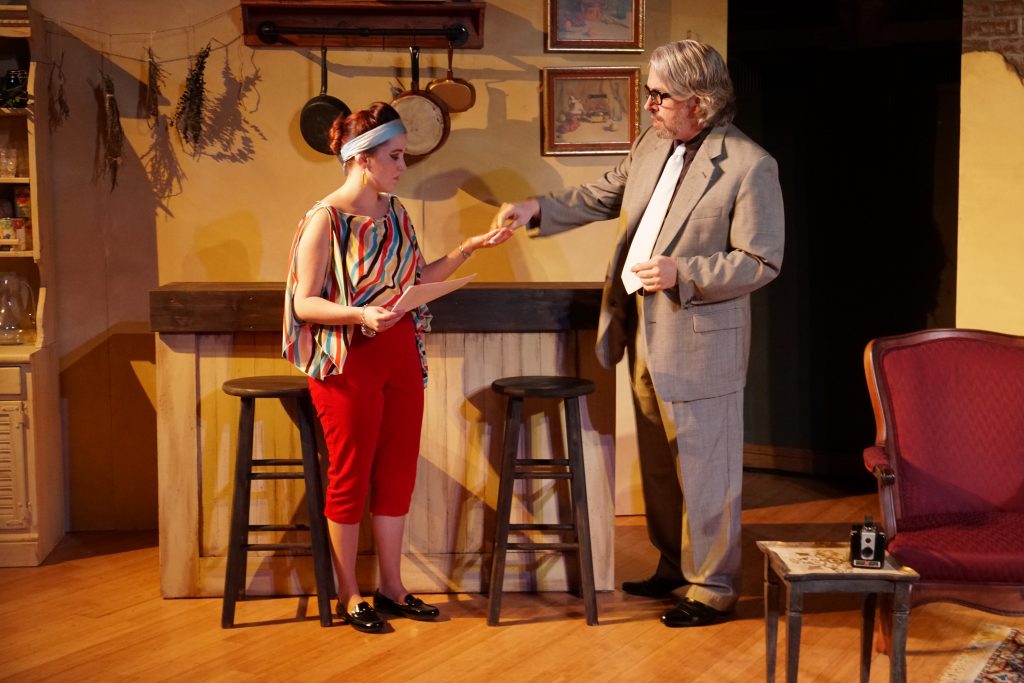
What started out as a forced happy family gathering unravels into shock and betrayals, attitudes are laid bare, and scabs are picked at and reformed. Some prefer not to play along, others mask their feelings for survival, and the perpetual role-playing is ongoing.
All six are clinging – whether to fading beauty, to their comfortable lifestyle, to forging a new identity, to the past, to keeping up appearances, their deceptions, or to whom they think they are/should be.
As the self-absorbed Rodney, John Wolters is revelatory, displaying a dramatic heft that you don’t often see when he’s trotting the boards, usually (but not always) in lighter fare. I wish Nelson had not written Rodney as a cliché.
Sartorially splendid, Rachel Tibbetts’ Eva craves the spotlight as much as her actor brother, and she fools no one as a busybody Karen trying to tell everyone else how to live their lives. Her equally loud brother indulges her, and Tibbetts embraces being abrasive in a role that’s mostly comical, but she conveys enough depth to make it more than one-note.
As the not-fully-formed 25-year-old adult daughter Lee, Summer Baer modulates the tones between dutiful daughter, her stepmom’s pal, tolerant of her hovering aunt and supportive fiancé to Ted. But what is it that she wants? A conflicted Lee doesn’t appear to be as forceful expressing what she wants as everyone around her seems to know what’s best for her.
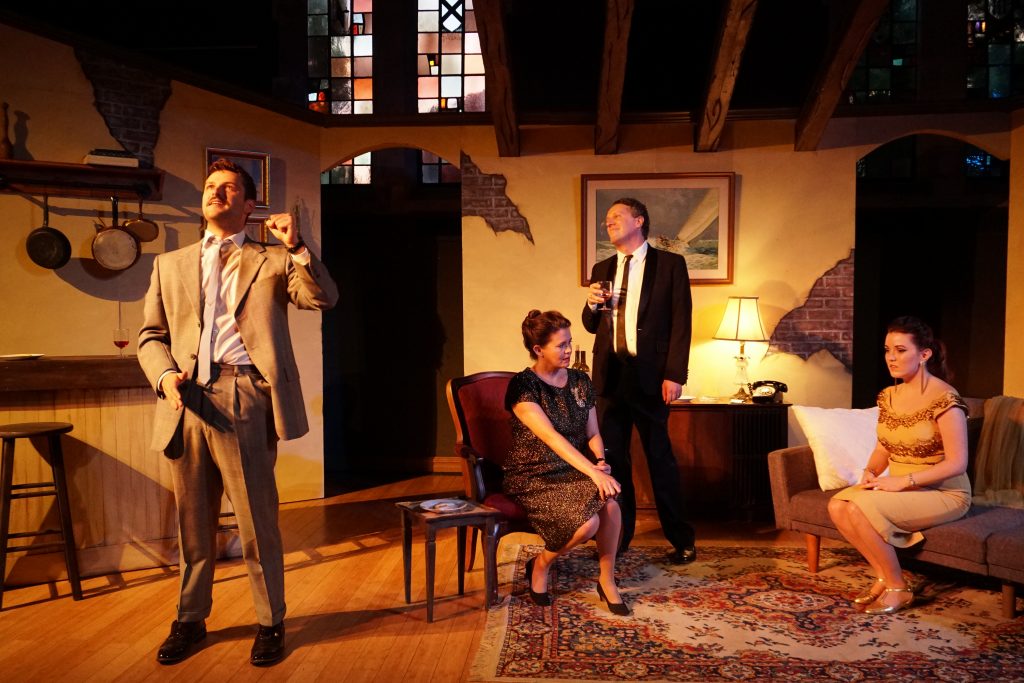
Although Bacus portrays Ted as assured as he’s making first impressions, it is as if Lee has blithely brought a prey into the lion’s den. You feel for this guy, hoping he’s better at seeing the red flags than we are.
Nelson has boxed himself into a corner narratively, and both Fay and Lee are frustratingly enigmatic – but the pair of actresses do everything they can for more fully realized interpretations.
However, his savvy choice of Rome 1962 is an exciting canvas for Bess Moynihan, whose scenic and lighting designs are astonishing, and for Liz Henning, whose astute costume designs are some of the best she’s ever done on local stages. Miriam Whatley has designed props that are ideally suited to the atmosphere.
Moynihan’s flair for striking production design – complete with an inviting patio –provides a good flow for character movements. Her superb lighting, especially the natural dawn, effectively establishes the shifting moods over the course of a night and day.
The drama’s impressive sleek look touches on what an attractive playground Italy was in the 1960s, not only because of the cultural revolution in movies, music, art, fashion, and style but how post-war Italy was putting fascism in the rear-view mirror and hedonism was in full throttle.
Hanrahan and company are successful in creating an intoxicating vibe of exotic travel, lush surroundings, and a pop art palette without having the benefit of idyllic sun-drenched exteriors. (I mean, we’ve seen “Three Coins in the Fountain”! I digress…).
As an example, Federico Fellini had unleashed “La Dolce Vita” in 1960 and was working on his opus, “8-1/2” (released in 1963), and he wasn’t the only director getting buzz in this new golden age. Michelangelo Antonioni’s “L’avventura” also was released in 1960.
Rodney looks like a guy who could be driving an Alfa Romeo while the handsome, well-mannered Ted could be tooling down the Amalfi Coast in a Fiat, doing his best Marcello Mastroanni.
The women wear their stylish cocktail dresses and chic casual attire with aplomb, sometimes adorned with bright scarves, and their hair is fixed in elegant styles – Lee’s swept-back ponytail, Eva’s classic elegant knot. The air of luxury permeates the small space.
During intermission or before/after the show, be sure to view a special fashion collection in the Chapel, which highlights haute couture of the era, and the designers, colors and styles that were famous.
Because of the fine performances, The Midnight Company has elevated this work, sharpening the explosive interpersonal dynamics. With inspired highly skilled craftmanship from the creative team, The Chapel’s intimate space has been admirably transformed into a mid-century modern with an international aesthetic.
Using the irony of such a luxurious landscape, Nelson has basically imprisoned his characters, who are products of their time, for better or for worse, which makes the sorrow and the unspoken regrets hang heavy in the air.
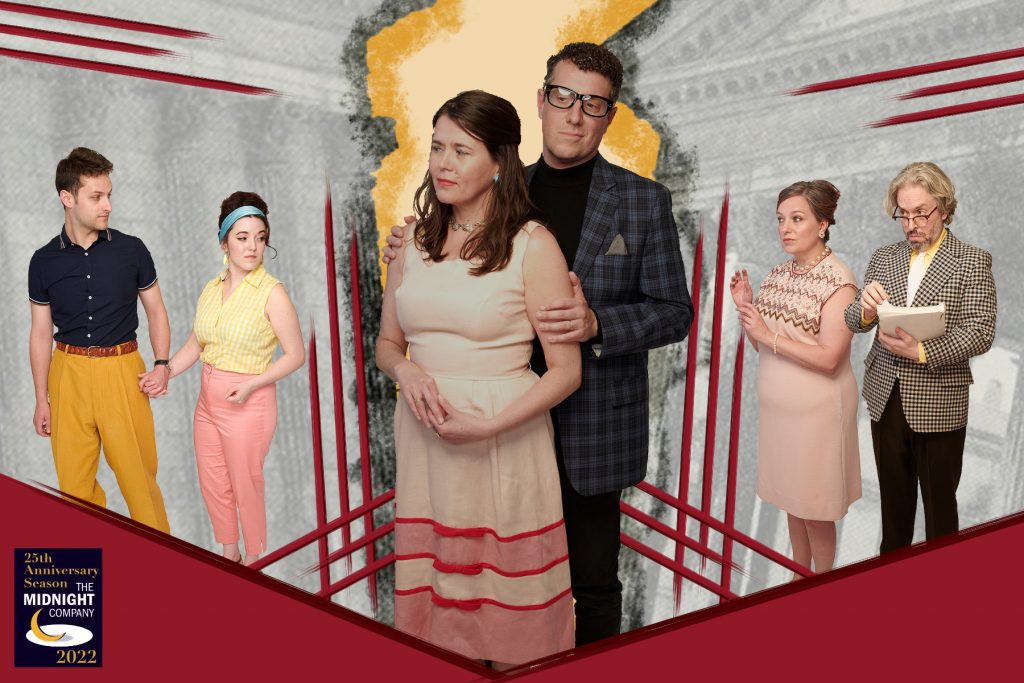
The Midnight Company presents “Rodney’s Wife” from July 7 to July 23, with performances at 8 p.m. on Thursdays, Fridays, and Saturdays and at 2 p.m. on Sunday, July 10 and 17, at The Chapel, 6238 Alexander Drive, St. Louis. For more information, visit: www.midnightcompany.com.

Lynn (Zipfel) Venhaus has had a continuous byline in St. Louis metro region publications since 1978. She writes features and news for Belleville News-Democrat and contributes to St. Louis magazine and other publications.
She is a Rotten Tomatoes-approved film critic, currently reviews films for Webster-Kirkwood Times and KTRS Radio, covers entertainment for PopLifeSTL.com and co-hosts podcast PopLifeSTL.com…Presents.
She is a member of Critics Choice Association, where she serves on the women’s and marketing committees; Alliance of Women Film Journalists; and on the board of the St. Louis Film Critics Association. She is a founding and board member of the St. Louis Theater Circle.
She is retired from teaching journalism/media as an adjunct college instructor.

